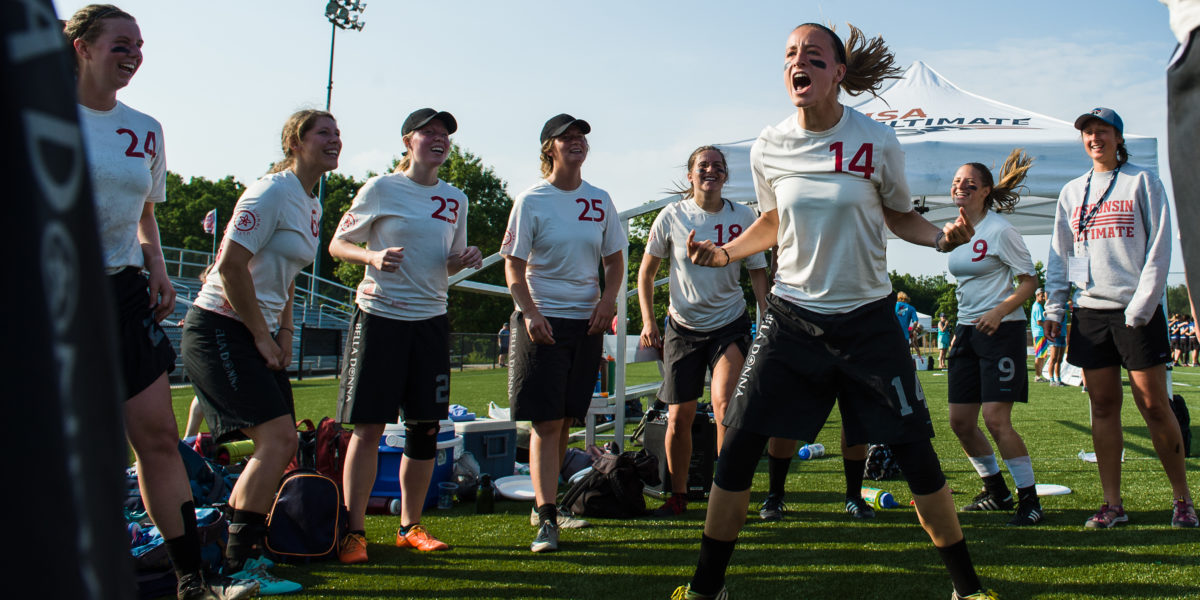 Anna Hrovat-Staedter (University of Wisconsin #14) leads the pre-game cheer. Friday 1st Round Pool Play action at the 2016 USA Ultimate College Championships, Raleigh, NC. 27 May 2016.
Anna Hrovat-Staedter (University of Wisconsin #14) leads the pre-game cheer. Friday 1st Round Pool Play action at the 2016 USA Ultimate College Championships, Raleigh, NC. 27 May 2016.
If you think that lifting, running track workouts, and killing it in practice is all you need in order to be an incredibly successful athlete, I’ve got news for you: you’ve only put together half of the ultimate puzzle. The bright-and-shiny part of our brain wants all the cool rotational exercises, the tabatas, and the drills that emphasize a quick first step. But if you’re not taking care of yourself between all these activities, you’re limiting your strength and progress to a large degree, putting yourself at risk for all kinds of injuries (acute and chronic) and limiting your performance ability. You’ve got to emphasize recovery if you want to maximize performance and keep playing this sport for a long time.
Not all recovery methods are created equal, however. Some of what you’re already doing could be swapped out for other techniques that would better serve your aims. If you’re interested in the research around this topic, you can look here and here for a more in-depth analysis of these methods. It’s important to note that there hasn’t been a lot of research conducted on recovery, and what has been conducted hasn’t involved sports like ultimate (one of the most looked-to studies involves cycling, which is pretty different than our sport). So remember that while this information will help if you’re lacking knowledge about recovery, it won’t all translate to our sport.
Let’s look at a few recovery procedures and how well they apply to different situations in ultimate!
Sleep is in a category by itself, as it is without doubt the most important recovery tool your body has. It’s basically a cure-all. Getting a good night’s sleep and taking naps when needed (especially during tournament weekends) is the best thing you can do for you body! More info about different kinds of sleep, rest, and their benefits can be found here.
Nutrition is also incredibly important, and also often neglected as the great recovery method that it is! People will happily spend 20 minutes in a stretch circle after a game, but won’t bother to eat enough protein to rebuild all the muscle they just ran off their body in the last three games. Protein is best for repairing muscle, so hitting it hard after heavy lifting and during tournaments is key. Carbs are required to restore good brain function and replenish energy stores, so they’re most important after conditioning workouts and after practices and tournaments (but not as much after lifting). If you want a detailed breakdown of when you should eat what, and lots of ideas for good snacks and meals, check this out.
Water and electrolyte replacement is needed to maintain good fluid balance, aid blood circulation, and provide energy. Electrolytes are especially important when you sweat a lot.If you’re one of those people who sweats all the time, prepare for and recover from playing and training with a sports drink that can help replenish electrolytes quickly. . If you’re not, the time to prioritize this is after the times when you do sweat a lot.
And a lot of people don’t realize that the water you drink today doesn’t help you today, it helps you tomorrow. That means part of your recovery plan actually needs to happen before you exercise. Start hydrating on Thursday or Friday for a weekend tournament!
Soft tissue and mobility work and its recovery benefits are largely anecdotal at this point in time, as few studies have even addressed these methods in any real way. Athletes under my guidance have found them to be very helpful in unsticking and releasing muscles that get stressed during both ultimate and lifting. The only hard rules are these: don’t roll right on top of an injury site (roll around it) and prioritize mobility over flexibility (joint movement over muscle length). If you’re looking for a five minute daily mobility routine, you can get that here.
Light movement and water therapy are two of the recovery techniques least supported by hard science. Several studies have shown that CWI (Cold Water Immersion) and CWT (Contrast Water Therapy) are more effective than HWI (Hot Water Immersion) in reducing body temperature and reducing muscle soreness, but there isn’t a ton of evidence either way (cool YouTube lecture about this topic here). Similarly, light movement (swimming, walking, gentle yoga/stretching) has been shown to have some effect over a short term, but might not make any difference the next day. Regardless, many ultimate players swear by ice baths and stationary bikes, and these methods might work for you too!
So how do you figure out what kind of recovery work to do in different situations? Our lives are already really full with work and school and ultimate and kids, how do we make sure we’re doing the right things with our precious time? I’ve made a few handy pie charts with exactly this kind of information, along with some tips and tricks. The most important recovery method, sleep, isn’t represented on these charts – remember to prioritize that over all else!
Recovery after Practices and Tournaments
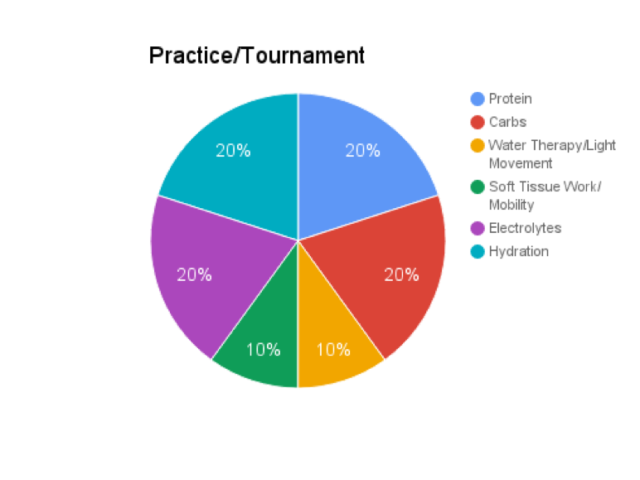
Main recovery goals: Replenish calories, hydrate
Field snacks: of protein, carbs and electrolytes
At tournaments: a team dinner should encourage protein/carbs/electrolytes/water
Secondary recovery goals: Restore performance ability by stimulating circulation
- dedicated ice bath or cool bath time
- fast walk at the end of play or practice
- make sure you know how to roll out and have the tools
Recovery after Conditioning
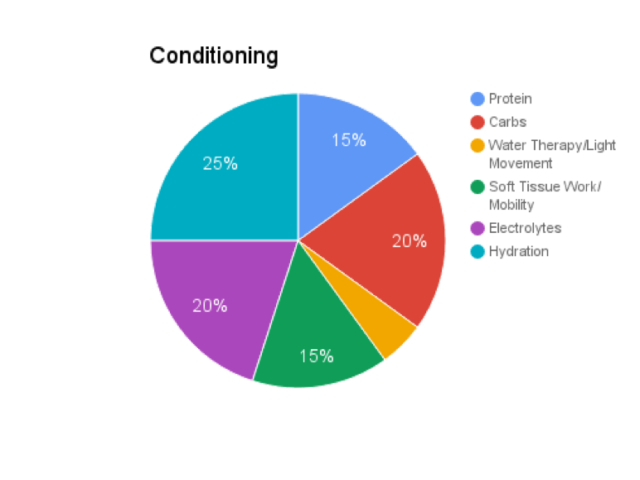
Main recovery goals: Replenish glycogen stores and replace sweat
Snacks: easy-to-digest carbs directly after
Hydration: at least two big litres of water with electrolytes mixed in (Gatorade, Nuun, sodium)
Secondary recovery goals: Repair musculature
- roll any tight spots that evening
- eat some good protein with dinner
Recovery after Heavy Lifting
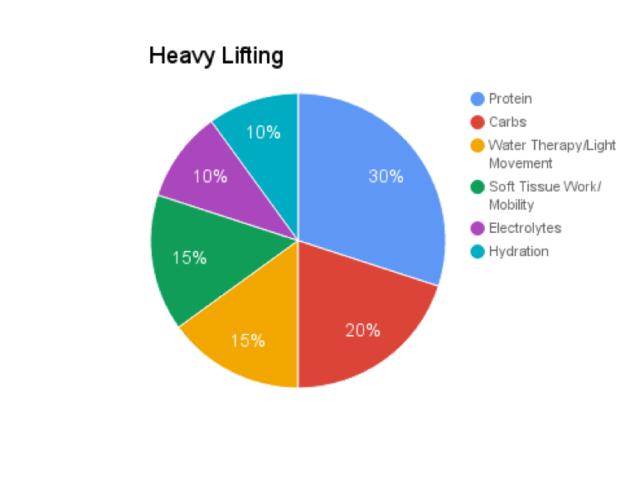
Main recovery goals: Repair musculature through nutrition
Snacks: protein first, and try to make the sources pure
Tip: don’t skimp on carbs, they’re needed!!
Secondary recovery goals: Reduce soreness
- don’t sit still, do something (anything) that evening
- roll out, paying special attention to the tightest spots

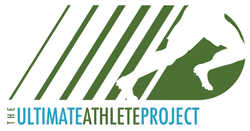










Comments Policy: At Skyd, we value all legitimate contributions to the discussion of ultimate. However, please ensure your input is respectful. Hateful, slanderous, or disrespectful comments will be deleted. For grammatical, factual, and typographic errors, instead of leaving a comment, please e-mail our editors directly at editors [at] skydmagazine.com.